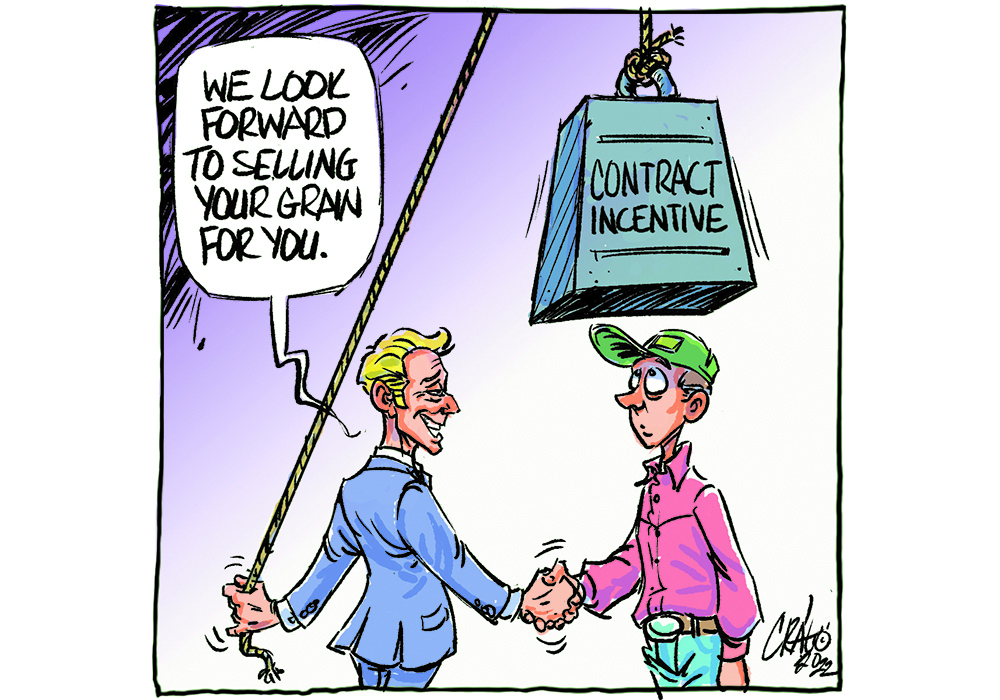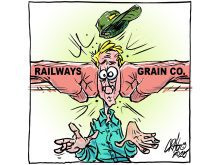Contracts for agricultural production can provide stability to farmers’ incomes and buyers’ supplies, but farmers bear the main burdens of deal uncertainty.
Ironically, contracts are supposed to mitigate farmers’ risk.
Grain contracts have been around for decades. Some farmers began using them after the Canadian Wheat Board ended. Others got on board later, when commodity prices started their most recent rise.
Typically, most producers don’t contract more than half their projected crop, or two-thirds at most. If available yield comes up 10 percent short and the replacement price is 10 percent higher than the agreed amount, it hurts but it’s manageable.
Read Also

Farmer ownership cannot be seen as a guarantee for success
It’s a powerful movement when people band together to form co-ops and credit unions, but member ownership is no guarantee of success.
Then 2021 came along and the one-sided risk in most grain contracts became painfully clear.
One party must pay for the delivered grain in the volume and quality specified. The other party bears the risks of major things unknown in the deal, such as weather and grain market spikes.
Contracts involving risks this large should be acknowledged with significant rewards attached or include a mitigation process when the obligations fall out of sync with normal weather and market situations.
They don’t.
To make matters more challenging for growers, lenders often ask farmers to use contracting as a way to mitigate price and delivery risks. This helps lenders ensure cash flow and allows repayment. The 2021-22 crop year will illustrate what those contract risks have brought to their farming clients in terms of abilities to pay.
Act of God or force majeure clauses might not be the answer to droughts or abnormal frosts. Western Canadian agriculture is highly dependent on rainfall and frost timing, and these are considered normal operating risks outside either clause.
When it comes to contracts, the bank might want them, the buyer and food processer might want them, but farmers must consider the overall risk of production contracting and put a price on it.
A contract with an act of God clause typically specifies that neither the farmer nor the crop’s buyer are responsible for delays in delivery if the cause is a fire, flood, wind, hail, explosion, power failure, transportation issues, war, embargo, an act of a government, strikes, lockouts or civil disobedience. These can’t be controlled by the buyer or seller.
But loss of a crop due to production failure does not constitute an act of God or a force majeure, unless the contract specifies it as a cause.
While commodity groups or organizations call for government intervention that would require grain contracts to include clauses relieving producers of these enormous risks, that is difficult at best.
In the days of the Canadian Wheat Board, some grain delivery contracts did contain clauses that covered production failures. But the time of government oversight has passed.
Today’s producers do have some government tools. AgriStability and crop insurance can underwrite what, in most years, would be a large portion of contracted risk. But sudden jumps in commodity prices have foiled that.
Private production insurance products can also mitigate large losses. The example of the 2021-22 season should give farmers a few cards when dealing with grain buyers and lenders in the future.
If there are ways to share crop production risks more fairly across the industry, now is the time bring them forward. The companies that offer these options will attract farmers’ attention more than those who don’t.
Karen Briere, Bruce Dyck, Barb Glen and Mike Raine collaborate in the writing of Western Producer editorials.















